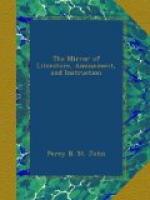THE LADY ANNE CARR,
BY THE AUTHOR OF “MAY YOU LIKE IT."
Have you not sometimes seen, upon the bosom of dark, stagnant waters, a pure, white water-lily lift up its head, breathing there a fresh and delicate fragrance, and deriving its existence thence—yet partaking in nothing of the loathsome nature of the pool, nor ever sullied by its close contact with the foul element beneath?
It is an honest simile to say that the gentle Anne Carr resembled that sweet water-lily. Sprung from the guilty loves of the favourite Somerset and his beautiful but infamous wife, she was herself pure and untainted by the dark and criminal dispositions of her parents. Not even a suspicion of their real character had ever crossed her mind; she knew that they had met with some reverse of fortune,—for she had heard her father regret, for her sake, his altered estate. She knew this, but nothing more: her father’s enemies, who would gladly have added to his wretchedness, by making his child look upon him with horror, could not find in their hearts, when they gazed on her innocent face, to make one so unoffending wretched. It is a lovely blindness in a child to have no discernment of a parent’s faultiness; and so it happened that the Lady Anne saw nothing in her father’s mien or manner, betokening a sinful, worthless character.
Of her mother she had but few and faint recollections. Memory pictured her pale and drooping, nay gradually sinking under the cureless malady which brought her to her grave at last. She remembered, however, the soft and beautiful smiles which had beamed over that haggard countenance, when it was turned upon her only child—smiles which she delighted to recognise in the lovely portrait, from which her idea of her mother was chiefly formed. This portrait adorned her own favourite apartment. It had been painted when the original was as young and happy as herself; and her filial love and fond imagination believed no grace had been wanting to make all as beautiful and glorious within.
As the Lady Anne grew up to womanhood, the sweetness of her disposition and manners began to be acknowledged by those, who had seen without astonishment her extraordinary beauty; and many persons of distinction, who would hold no kind of fellowship with the Lord Somerset, sought the acquaintance of his innocent daughter for her own sake.
The most beloved friend of the Lady Anne was the Lady Ellinor G——, the eldest daughter of the Earl of G——: and with her, Lady Anne often passed several months in the year. A large party of young ladies were assembled at G—— Castle; and it happened that a continual rain had confined the fair companions within doors the whole summer afternoon. They sat together over their embroidery and various kinds of needlework, telling old tales of fearful interest—the strange mishaps of benighted travellers—stories of witchcraft, and of mysterious murder.




